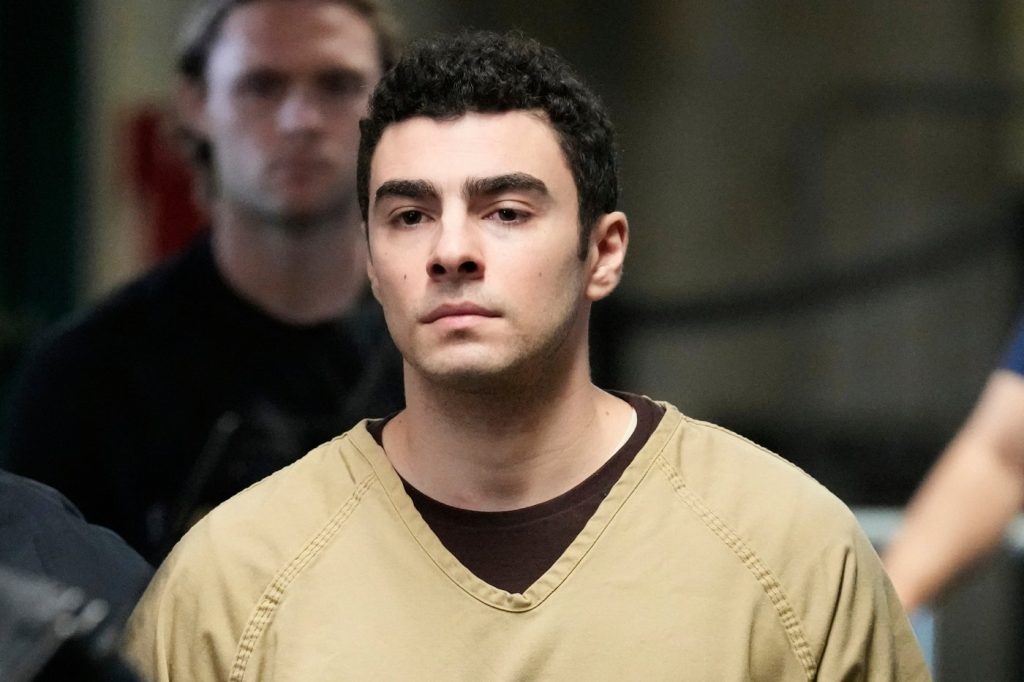NEW YORK (AP) – Prosecutors announced on Friday that they intend to proceed with the death penalty case against Luigi Mangione, who is accused of killing Brian Thompson, the CEO of UnitedHealthcare. In a court filing, they urged U.S. District Judge Margaret Garnett to reject the defense's motion to dismiss charges and eliminate capital punishment based on public statements made by Attorney General Pam Bondi, which suggested that Mangione deserves execution.
The U.S. attorney's office in Manhattan argued that pretrial publicity, even when it is intense, does not constitute a constitutional violation. They cited past rulings from both the Supreme Court and the 2nd U.S. Circuit Court of Appeals in support of their case. The prosecution also addressed the defense's attempt to suppress evidence collected during Mangione's arrest, including a 9 mm handgun and a notebook in which he allegedly detailed his intent to eliminate an insurance executive.
According to prosecutors, the police had justified reasons to search Mangione's backpack to ensure no dangerous items were present. Moreover, they stated that his statements to law enforcement were made voluntarily prior to his arrest, undermining the defense's claims that the evidence was collected unlawfully.
Prosecutors pushed back against the defense's request to dismiss the case or prevent the government from pursuing capital punishment, arguing that any concerns could be resolved through careful jury selection where potential jurors would be questioned about their knowledge of the case. They dismissed the defense's assertion of a constitutional crisis as a mere recycling of previously rejected arguments, emphasizing that none were grounds for dismissing the indictment or denying a legally sanctioned penalty.
Luigi Mangione, 27, has pleaded not guilty to both state and federal murder charges. In September, a judge dismissed terrorism charges against him but maintained other charges, including that of intentional murder. His next hearing in the state case is scheduled for December 1, as his lawyers aim to prevent prosecutors from utilizing much of the evidence collected at the time of his arrest. His federal court appearance is set for January 9.
Brian Thompson, aged 50, was murdered on December 4, 2024, as he arrived at a Manhattan hotel for UnitedHealthcare’s annual investor conference. Surveillance footage captured the harrowing moment when a masked gunman shot him from behind. Notably, police reported that the ammunition used in the attack bore markings echoing a phrase related to how insurers evade claims, with words like "delay," "deny," and "depose" inscribed on it.
Mangione, described as an Ivy League-educated scion of a wealthy family in Maryland, was arrested five days after the incident while eating at a McDonald’s in Altoona, Pennsylvania, approximately 230 miles west of Manhattan. In an April announcement, Attorney General Bondi instructed federal prosecutors to pursue the death penalty, declaring that the crime amounted to a "premeditated, cold-blooded assassination that shocked America."
The defense argued in a September court filing that Bondi's comments—made in Instagram posts and TV interviews—indicated that the decision to seek the death penalty was politically motivated rather than based on the merits of the case. They claimed her public statements biased the grand jury process that led to his indictment shortly thereafter.
Furthermore, the defense criticized public actions related to Mangione's arrest, such as a highly publicized "perp walk" that involved him being escorted by armed officers, as well as comments made by then-President Donald Trump, who, despite legal norms restricting pretrial commentary, expressed his opinions about Mangione's actions in a televised interview. Trump described the shooting as indicative of a "pure assassin."
In response to the defense's claims, the prosecution contended that Bondi's statements had no bearing on the grand jury process and argued that there was no evidence indicating the jurors' decision to indict was influenced by those remarks. They also asserted that the defense's arguments relied on speculation rather than factual evidence, reiterating that prior rulings provide no basis for claiming pretrial publicity could impair the grand jury's constitutional responsibilities.











